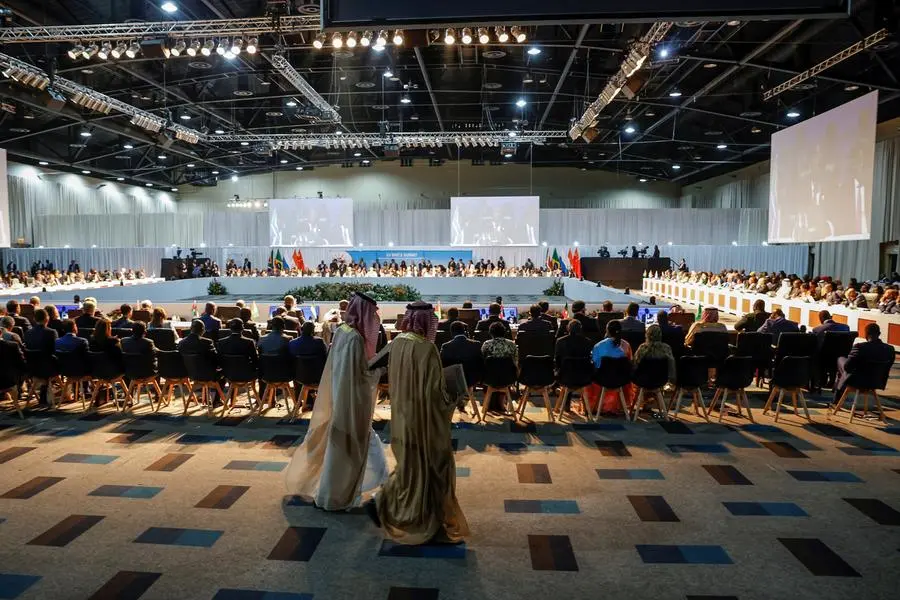PHOTO
The recent inclusion of Egypt in BRICS, the economic bloc of developing nations, will not serve as an immediate fix to the cash-strapped country’s current economic ordeal, according to experts.
On Thursday, the BRICS bloc, which includes Brazil, Russia, India, China and South Africa agreed to admit six new countries under its fold in a move widely seen as an attempt to create an alternative economic world order. The new entrants included Egypt, Saudi Arabia, Iran, Ethiopia, Argentina and the UAE.
“Joining BRICS in our view is unlikely to be a major boost to Egypt’s economy and is more likely to be felt as an impact through the external position in trade and foreign capital inflows, but this will take time to develop,” James Swanson, an analyst with Capital Economics told Zawya.
In recent years, Egypt has been struggling with a widening financing gap and a weakening local currency. Since March 2022, the Egyptian pound has lost more than 50 percent of its value, and inflation rates have recently topped at 35%.
The Egyptian government has been relying heavily on borrowing from global markets and multilateral partners. Egypt's external debt eventually jumped to nearly $163 billion in December 2022 from under $40 billion in 2015, according to the Central Bank of Egypt.
The news of its BRICS induction was widely celebrated by the Egyptian government, which marketed it as a potential lifeline to the struggling economy.
Finance Minister Mohamed Maait reportedly said that it would increase FDIs, boost Egypt’s exports and reduce the country’s reliance on the US dollar, as BRICS members can trade using local currencies.
“The FX crunch is unlikely to be alleviated, particularly the heavy reliance on the dollar, but it may create opportunities for greater capital inflows,” Swanson added. “What’s more with Saudi Arabia and Egypt being invited into the group, it may provide more confidence among the Gulf states to further Egypt’s privatisation program.”
The BRICS expansion is the first since 2010, when the founding four states invited South Africa to join.
The 14-year-old bloc has been debating the need to wean its members off the dollar, but with no concrete resolution.
In a report issued last week, London-based Capital Economics downplayed the recent expansion, arguing that it might be hindered by the divergent “geo-political priorities” of key members, namely China and India.
"The enlargement is a benefit for the new entrants that are hungry for capital, eg Egypt,” Hasnain Malik, an analyst with Tellimer told Zawya.
“But this assumes they would not have seen capital inflow anyway from the richer BRICS countries, and that any capital provided via a BRICS institution does not jeopardise that from other multi and bilateral sources," Malik said.
In February, Egypt joined the bloc’s main institutional arm, the New Development Bank, which was initially created with a capital of $100 billion to finance infrastructure and development projects in member states, emerging markets, and other developing countries.
“If BRICS enlargement is partly motivated by creating an alternative global center to the western ‘rules-based order’ then, in future, there may come a time when engagement with BRICS-11 complicates dealings with the larger, established multilaterals,” Malik added.
However, Swanson ruled out the possibility that Egypt, which stands as the second-largest IMF debtor by amount after Argentina, with an outstanding balance of $18 billion, would substitute BRICS with Bretton Woods institutions.
“In terms of the impact on Egypt’s relations with western financial institutions, such as the IMF, it is unlikely to have a major impact,” Swanson said.
“The one possible scenario is that Egypt may now be able to turn to the BRICS for financial lending rather than the IMF, which could come with more lenient conditions, but that is not something on the BRICS’ agenda for now, and Egypt will continue to abide by and remain close with ties to the IMF and other institutions,” he added.
(Reporting by Noha El Hennawy; editing by Seban Scaria)





















